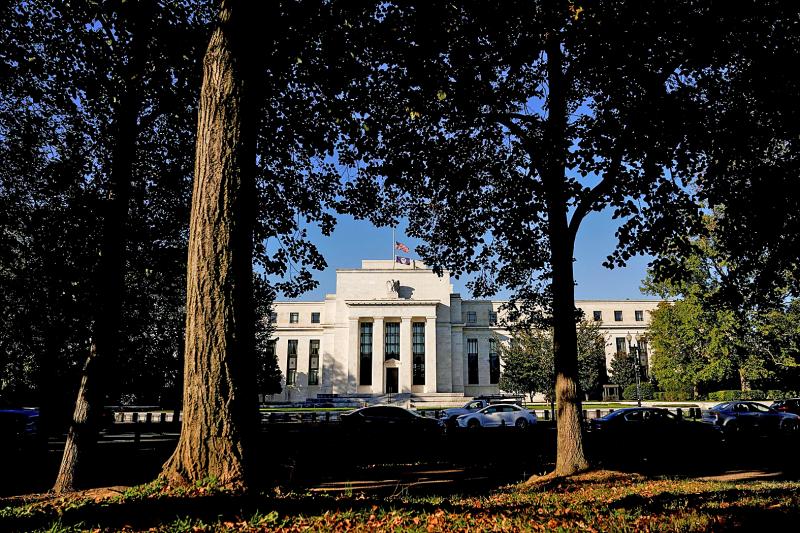The US Federal Reserve has banned top officials from buying individual stocks and bonds, as well as limit active trading, after an embarrassing scandal that led two officials to resign and clouded Fed Chairman Jerome Powell’s path to renomination.
“These tough new rules raise the bar high in order to assure the public we serve that all of our senior officials maintain a single-minded focus on the public mission of the Federal Reserve,” Powell said in a statement on Thursday.
The Fed’s action marks its most significant response yet to recent revelations over trading last year by a few top policymakers as the central bank fought to protect the US economy from the COVID-19 pandemic.

Photo: Reuters
While Powell’s critics seized on the disclosures as ammunition to block his potential renomination by US President Joe Biden and demanded an investigation, Powell chair had said little beyond assuring Americans the rules would be thoroughly reviewed.
US Senator Elizabeth Warren, among his most vocal opponents, has asked the Securities Exchange Commission to look into whether any insider trading rules were breached.
Critics also seized on Powell’s own financial disclosure last year — which showed that he sold between US$1 million and US$5 million in a broad-based stock index fund in October last year —to question keeping him at the helm of the central bank.
Powell’s term ends in February. Fed watchers said that if the ethics scandal was hurting Powell’s chances for another four years, his prompt action to tighten the rules could tip the balance back in his favor.
“I don’t think there is anything that will satisfy Powell’s small, but vocal group of critics — they will continue to use any argument they can find,” said Roberto Perli, a former Fed economist and partner at Cornerstone Macro LLC. “But regardless, Powell showed leadership and the ability to do the right thing quickly. So, if anything, I think this strengthens his candidacy. The Fed needs an independent chair.”
Under the new policies, senior Fed officials — including regional bank presidents, Washington governors and senior staff — are limited to purchasing diversified investment vehicles, such as mutual funds, the central bank said in a statement on Thursday.
New appointees will have to divest certain assets before joining, such as a portfolio of individual corporate, a Fed official said on a briefing call with reporters.
Other rules “to help guard against even the appearance of any conflict of interest in the timing of investment decisions” include providing 45 days’ advance notice for buying and selling securities, obtaining prior approval for such transactions and holding investments for at least one year. Additionally, “no purchases or sales will be allowed during periods of heightened financial market stress,” the Fed said.
“Today’s announcement is a start, but we can’t let up now,” US Senator Sherrod Brown, who chairs the Senate Banking Committee which oversees the Fed, said in a statement. “The American people need to be able to trust that the Federal Reserve works for them — that’s why strong reforms are needed now more than ever.”
The 12 regional Fed presidents are required to publicly disclose financial transactions within 30 days, a policy that already applies to Washington-based governors and senior staff, the Fed said. They were previously only required to do so on an annual basis.

Taiwanese suppliers to Taiwan Semiconductor Manufacturing Co. (TSMC, 台積電) are expected to follow the contract chipmaker’s step to invest in the US, but their relocation may be seven to eight years away, Minister of Economic Affairs J.W. Kuo (郭智輝) said yesterday. When asked by opposition Chinese Nationalist Party (KMT) Legislator Niu Hsu-ting (牛煦庭) in the legislature about growing concerns that TSMC’s huge investments in the US will prompt its suppliers to follow suit, Kuo said based on the chipmaker’s current limited production volume, it is unlikely to lead its supply chain to go there for now. “Unless TSMC completes its planned six

Intel Corp has named Tasha Chuang (莊蓓瑜) to lead Intel Taiwan in a bid to reinforce relations between the company and its Taiwanese partners. The appointment of Chuang as general manager for Intel Taiwan takes effect on Thursday, the firm said in a statement yesterday. Chuang is to lead her team in Taiwan to pursue product development and sales growth in an effort to reinforce the company’s ties with its partners and clients, Intel said. Chuang was previously in charge of managing Intel’s ties with leading Taiwanese PC brand Asustek Computer Inc (華碩), which included helping Asustek strengthen its global businesses, the company

Power supply and electronic components maker Delta Electronics Inc (台達電) yesterday said second-quarter revenue is expected to surpass the first quarter, which rose 30 percent year-on-year to NT$118.92 billion (US$3.71 billion). Revenue this quarter is likely to grow, as US clients have front-loaded orders ahead of US President Donald Trump’s planned tariffs on Taiwanese goods, Delta chairman Ping Cheng (鄭平) said at an earnings conference in Taipei, referring to the 90-day pause in tariff implementation Trump announced on April 9. While situations in the third and fourth quarters remain unclear, “We will not halt our long-term deployments and do not plan to

The New Taiwan dollar and Taiwanese stocks surged on signs that trade tensions between the world’s top two economies might start easing and as US tech earnings boosted the outlook of the nation’s semiconductor exports. The NT dollar strengthened as much as 3.8 percent versus the US dollar to 30.815, the biggest intraday gain since January 2011, closing at NT$31.064. The benchmark TAIEX jumped 2.73 percent to outperform the region’s equity gauges. Outlook for global trade improved after China said it is assessing possible trade talks with the US, providing a boost for the nation’s currency and shares. As the NT dollar